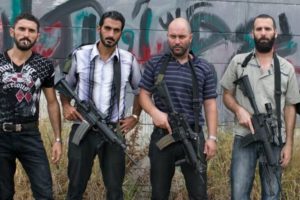‘Fauda’ season 3: Clumsy hasbara in the imagined Gaza dystopia

Fauda” Season 3. Promotional image from Netflix
Emad Moussa writes in Mondoweiss:
In its first two seasons, “Fauda,” the Netflix drama made in Israel, relatively succeeded in individualising the enemy and challenging some of the intensely politicised stereotypes, presenting the Palestinians as people just ‘like us’ with internal and external struggles. That left the spectators, especially in the mainstream Jewish collective, with mixed feelings about what it is that feeds animosity in the Israeli-Palestinian conflict.
Season three, however, (which was released earlier this year) seems to have reverted to the stereotypes and cliched narratives that “Fauda” producers repeatedly claimed to have challenged. Instead of gravitating Palestinians closer toward centre stage, this season has pushed them once again to the backstage.
This time, Fauda makers decided to leave the somewhat familiar realm of the West Bank and do something bold. They sent the Israeli undercover commandos on a daring mission into the heart of the Gaza Strip.
The season follows a clear, easily distinguishable storyline that evolves over the course of twelve episodes. Doron is now struggling with familial issues. He neglects his son and becomes a father figure to Bashar, a young Palestinian boxer from Hebron. Unaware of Doron’s true identity, Bashar unintentionally enables the assassination of his Hamas cousin. Bashar – assisted by his father – seeks redemption by kidnapping two Israeli hikers and smuggles them into Gaza. The Israeli commando unit is then sent into Gaza to retrieve the captured Israelis and eliminate Hamas’ most wanted man, Hani Al-Jabari. Throughout, Doron feels he’s the reason Bashar turned to violence.
